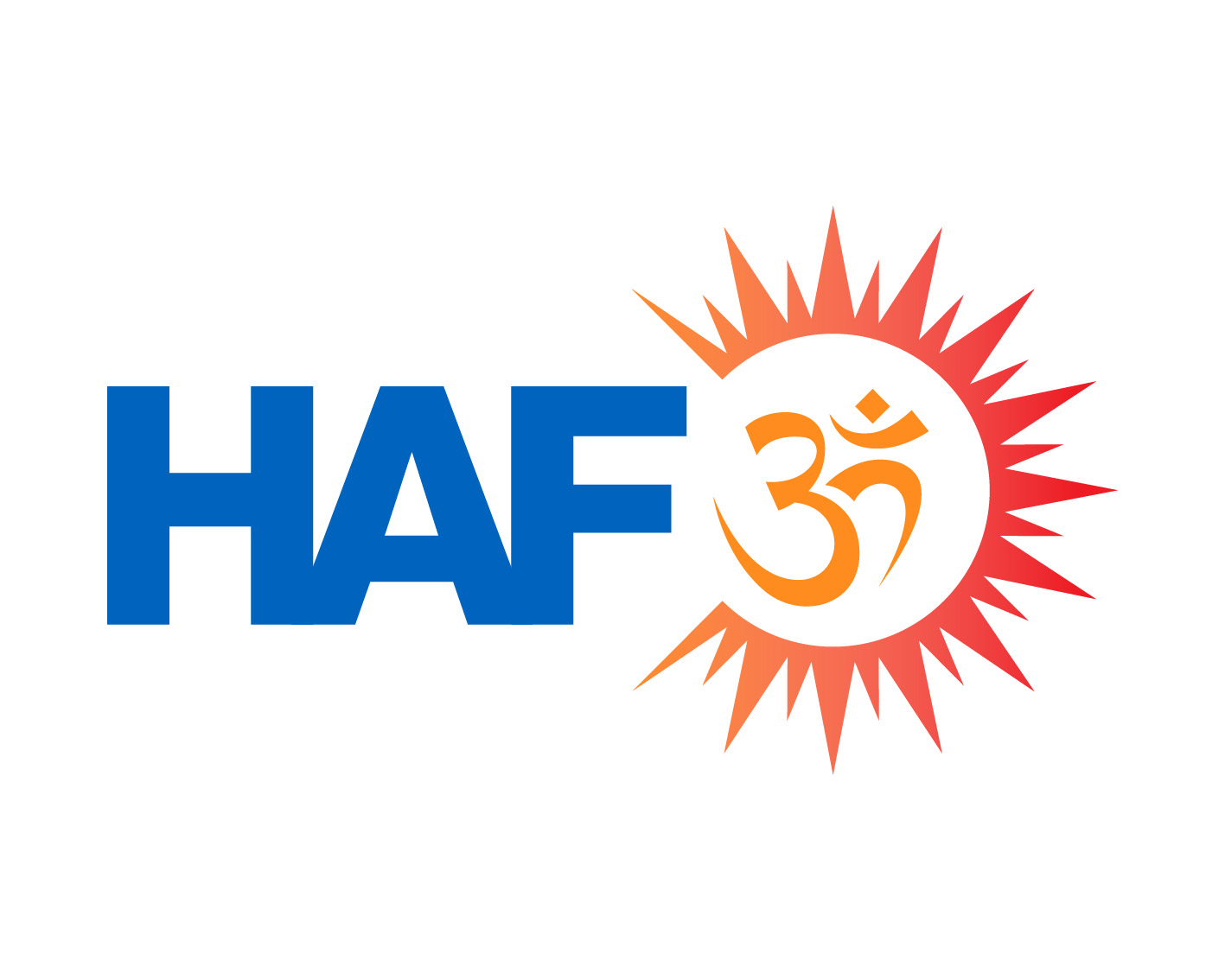
HAF is politically agnostic and non-partisan, meaning we’re informed about issues we care about and work with anyone who is solutions oriented towards those issues and where the proposed solutions align with Hindu values.
So, if you look at HAF’s record on any of the major issues of the day, those on the right may view us as a left or center-left organization based on many of our stances on domestic issues. Those on the left may view us as a right or center-right organization when it comes to US foreign policy and terrorism in South Asia.
HAF primarily focuses on issues facing Hindus in the United States and the way in which Hinduism is presented to the American public, in the media, and in our schools.
When we speak on issues in India it is in the content of creating a better understanding of the complex and nuanced political and social dynamics there.
We also speak out on violations of the human rights of Hindus in countries and regions where they are minorities; we are the only organization to produce reports about this in a systematic and sustained way.
In 2017 our executive director was named a faith leader to watch by the Center for American Progress, a solidly liberal organization.
If you look at HAF’s Wikipedia page, however, we are a Hindu supremacist organization, supporting repression of minority religions in India, a cheerleader for the BJP and Indian Prime Minister Narendra Modi, with foundational ties to paramilitary groups, sending money to India to support fascism and “slow genocide”.
None of these characterizations on our Wikipedia page are true. At all. They are lies.
Because of the way in which Wikipedia has been hijacked and manipulated — at least articles on contemporary political issues in South Asia are concerned — the record and motivations of HAF have been grossly misrepresented.
Such misrepresentation is clearly deliberate.
Experts we consulted on how to address the falsehoods spread on our page about our organization told us that even changing the suite number of our office (we moved down the hall into a different space during the covid pandemic) was challenged by antagonistic editors. We were told, after they observed our page and the discussions around it for nearly a year, that they had never seen a page so tightly controlled by editors who clearly don’t want an accurate, objective and balanced view of HAF to be presented on our page.
Why?
At the root of this is the politics of India and South Asia.
The tensions between India and Pakistan, between Pakistan and Bangladesh, are well known and well publicized. What is not well publicized is that there is an information war going on as well.
On one side are those people opposed to the current BJP government in India, and some opposed to the idea of a united India at all. Many of the most vocal voices on this side support an independent Kashmir,, likely Islamist-controlled, or a Kashmir merged in total with Pakistan. Often accompanying such a view is that anyone standing up for Hindu culture and Hindu rights, or a non-partisan nuanced view of politics in India, is automatically a Hindu supremacist determined to wipe out all non-Hindus in India.
On the the other side is everyone who doesn’t hold these views. This camp is the one in which HAF sits and is the reason why our page is a caricature of our organization, a view in the metaphorical funhouse mirror.
This information war is out in the open for anyone engaged in this space, who follows politics in India and South Asia, who lives in the region or in the diaspora. But it’s hidden to everyone else.
And so HAF’s record is misrepresented, grossly so.
And we’re not alone. The pages of many openly Hindu authors, academics, and activists have been similarly hijacked and, in essence, vandalized. Some of the same people holding HAF’s page under lockdown have created and maintain the pages of some of our most vocal opponents.
If our page was neutral and accurate, abiding by accepting sourcing methods of journalism and academia, here is what it might say:
The Hindu American Foundation (HAF) is an American Hindu advocacy organization, founded in September 2003 by Sanjay Garg, Nikhil Joshi, Mihir Meghani, Nagendra Rao, Aseem Shukla, and Suhag Shukla.
The organization describes itself as an education and advocacy group that aims to educate the public about Hinduism and the issues impacting Hindus in the US and globally.
According to its critics, HAF has repackaged Hindu nationalism in the language of “Hindu rights” in a way to suit mainstream American politics. Such critiques are not substantiated and do not address directly HAF’s policy stances on a variety of issues ranging from free speech to gun safety reform.
Advocacy
Persecution of Hindus and human rights reports
During 2004–2005 HAF held events to educate legislators about issues of concern to Hindu Amerians. These included the abuse of Hindus in Muslim-majority regions of South Asia, including Bangladesh, Kashmir, and Pakistan.
In 2005, the organization released its first human rights report, focusing on the status of the human rights of Hindus, mainly in Bangladesh, Pakistan, and the Kashmir Valley. The 71-page report compiled media coverage and firsthand accounts of human rights violations perpetrated against Hindus because of their religious identity. The incidents are documented, often quoting from well-known international human rights organizations.
The report was presented to the co-chairs of the US Congressional Caucus on India and Indian-Americans, representatives Ileana Ros-Lehtinen, a Republican, and Gary Ackerman, a Democrat. Both of these members of Congress endorsed it.
From 2005–2021, the Foundation expanded the scope of its human rights report and continues to release an annual report entitled “Hindus in South Asia and the Diaspora”. These reports have covered Hindu human rights in eight countries plus the Indian Union Territory of Jammu and Kashmir.
In 2020, HAF organized nationwide candlelight vigils, done in partnership with other community organizations, to mark the 30th anniversary of the Kashmiri Pandit Exodus.
In 2021, in partnership with Bangladesh Hindu Buddhist Christian Unity Council, and other Bangladeshi community organizations, HAF solemnly commemorated the 50th anniversary of the 1971 Bangladesh Liberation War and accompanying genocide targeting Bangladeshi Hindus, garnering statements of support from Rep. Sheila Jackson Lee (D-TX), Judy Chu (D-CA), and Ro Khanna (D-CA), as well as former US Representative and candidate for president Tulsi Gabbard. Because of this campaign the HAF has been blocked by the Government of Pakistan.
HAF is a wholly independent, American organization duly registered in the State of Florida as a not-for-profit corporation and a non-partisan, non-profit tax-exempt public charity pursuant to Internal Revenue Code Section 501(c)3. HAF has absolutely no affiliation or ties to the Rashtriya Swayamsevak Sangh or any other organizations or political parties either here in the US or abroad. All corporate and tax filings are publicly available and provide ample evidence of HAF’s operational and financial independence. HAF has a Platinum Seal of Transparency from GuideStar.
Civil rights issues and other activism in the United States
In 2004, the organization took part in a court case challenging the public display of the Ten Commandments in Texas, where it has appeared as amici curiae (friend of the court). It argued that the display represented an “inherent government preference” for Judeo-Christian religions over others and the state must be reminded of its obligation to maintain religious neutrality.
In 2005, it joined the American Jewish Committee to jointly sponsor a program at Stanford on “countering biases against Hindus and Jews on the College campus.” In a meeting with the American Jewish Committee, Mihir Meghani drew parallels between the asserted endangerment of Hindus in India and that of Jews in Israel, and “the shared risks they face from neighbors with long histories of terrorism.”
In 2007, the Foundation released the first systematic reporting on hatred and bigotry directed against Hindus expressed online.
In 2008, HAF, along with a coalition of other religious groups, filed a lawsuit and blocked the issuance of Christian themed license plates in South Carolina.
In 2010, the organization launched the Take Yoga Back campaign, as a reaction to the commercialization and secularization of yoga. They contended that yoga was far more than asana (physical postures) and integrally tied to Hinduism, a fact HAF asserted has been sidelined by the modern Western yoga practice and its presentation in the media. In backlash, this message was sometimes interpreted as meaning that yoga could not be practiced outside of Hinduism, inviting criticism from Deepak Chopra and Meera Nanda.
In 2010, HAF published a policy brief on Hinduism and homosexuality, asserting that “ancient Hindu teachings may allow Hindus to more openly embrace LGBT rights and marriage equality.”
In 2010, the organization also published a report on caste, detailing how caste is not an intrinsic part of Hindu theology and that it was a social phenomenon found in all communities of Indian society to this day. The report characterized caste-based discrimination as a major human rights problem, concluding that only Hindus, through reform movements and education, can rid Hindu society of caste-based discrimination. It also castigates organizations like Dignity Freedom Network for arguing that Dalits are not Hindus.
In 2013, HAF joined a coalition of Christian, Jewish, Hindu, Sikh, and Muslim organizations urging the Justice Department to investigate the New York City Police Department for discriminatory surveillance of American Muslims.
In 2015, as a part of the Hate Crimes Coalition, HAF participated in the drafting and submission of the edits to an FBI manual to specifically track hate crimes against Hindus, Sikhs and Muslims.
That same year, HAF joined a broad interfaith coalition as amicus curiae in US v. Windsor in which the US Supreme Court declared Section 3 of the 1996 “Defense of Marriage Act” (DOMA) unconstitutional. In a close 5-4 decision, the Court found that same-sex couples who were legally married are entitled to equal treatment under federal law.
In 2016, HAF along with Indiaspora and other organizations successfully petitioned the United States Postal Service to issue a stamp commemorating the Hindu festival of Diwali.
In 2020, HAF filed a motion to intervene in the case of California Department of Fair Employment and Housing v. Cisco Systems. The organization’s motion alleged that the way in which the State of California defined caste, as a Hindu theological and social hierarchy, was unconstitutional, on the grounds that the State was defining Hindu beliefs for Hindus. As of February 2023, the case is still pending.
In October 2022, HAF sued the California Civil Rights Department (formerly known as the California Department of Fair Employment and Housing) directly in federal court, reiterating the points made in its motion to intervene, that the state of California is acting in an unconstitutional manner in attempting to legally define Hindu beliefs for Hindus.
Climate change and our environment
In 2015, the Foundation partnered with The Bhumi Project (a Hindu environmental project of the Oxford Centre for Hindu Studies) and multifaith environmental organization GreenFaith, to create the Hindu Declaration on Climate Change 2015.
The Declaration “asks the world’s 900 million Hindus to transition to using clean energy, adopt a plant-based diet, and lead lives in harmony with the natural world.” The Declaration was signed by more than 60 Hindu spiritual and social leaders and organizations from around the world, prior to the COP21 Paris climate talks.
In 2019, HAF partnered with Yale University and other Hindu environmental and community organizations for the “Hindu Earth Ethics and Climate Action” conference.
Educational advocacy
In 2006, HAF was involved in the California Hindu textbook controversy. On March 16, 2006, it filed a lawsuit contesting procedural violations by the California’s Curriculum Commission’s and its unequal treatment of Hindu groups in the textbook adoption process. Members of the Commission held a series of ex parte and closed door meetings which were required to be public by California law to reject many of the Vedic Foundation and Hindu Education Foundation‘s suggested edits to California’s textbook curriculum on Hinduism and India. The proposed changes had been publicly opposed by Indologists organized by Michael Witzel, who renounced them as “politically and religiously motivated”. In September 2006, a judge ruled that the CA State Board of Education had violated its textbook approval process, but the court also ruled to retain the textbooks, noting the significant expense associated with reissuing the textbooks.
In 2014, the Texas State Board of Education voted to adopt new textbooks that incorporated over 100 corrections submitted by HAF working in conjunction with scholars and historians. Some of the changes in the textbooks include coverage of Hinduism and Hindus in contemporary world history and geography, greater context in the explanation of caste, and the first-ever K-12 textbook mention of Hindu saint Adi Shankara.
In 2016, HAF released its first report on bullying on Hindu students in US schools. Based on preliminary data collected the previous year, Classroom Subjected: Bullying and Bias Against Hindu Students in American Schools found that half of the students surveyed felt awkward and socially isolated due to their religious identity, with one-third of students having experienced bullying due to religious identity.
From 2014–2017, HAF participated in the California state process for creating new content standards for state-approved textbooks. Working with other community groups, including the Hindu Education Foundation, and a coalition of scholars in social studies and religious studies, HAF submitted extensive line edits and suggested language on how Hinduism and the history of India would be presented to some 2 million middle and high school students in the state. These efforts were protested by some South Asian academics and Neo-Buddhist activists who posited that HAF and its allies were attempting to whitewash California’s history textbooks, in particular the history of caste in South Asia. On November 16, 2017 the California Board of Education voted to adopt textbooks from 10 publishers incorporating many of the edits supported by HAF and its allies, and rejected textbooks from 2 publishers which failed to incorporate them.
Controversies
Allegations of connections with Hindu nationalist organizations
Allegations of operational connections between HAF and the various Hindu nationalist groups known collectively as the Sangh Parivar have been leveled at the organization since its founding to this day.
In 1991, while at the University of Michigan, HAF co-founder Mihir Meghani was a cofounder of the Hindu Students Council (HSC), a nationwide network of student societies affiliated to the Vishva Hindu Parishad America (VHPA). He also is credited as the author of an essay titled “Hindutva: The Great Nationalist Ideology,” on the website of the Bharatiya Janata Party, which asserted that Hindus and Hinduism were denigrated by the Indian National Congress and that Hindus rose up to demand a “true secularism.” The essay drew a parallel between the Hindu experience and that of Jews, African Americans and colonized groups, as well as characterizing the demolition of the Babri Masjid as the release of “thousands of years of anger and shame.”
Meghani wrote in a Letter to the Editor published in the print edition of India Abroad on April 27, 2006 that he may have written a similar essay in college decades ago, but long disavowed it and did not stand by the tone of its content. He also stated that HAF was cofounded by nearly half a dozen others, and what he may have written in an essay long before HAF was founded and had no connection to other cofounders, the foundation, and the Foundation’s track record of education and advocacy.
In addition, it is regularly reported that Mihir Meghani has been a member of Hindu Swayamsevak Sangh USA. Not only does Dr. Meghani have no formal ties to this organization, HSS USA does not offer membership.
In 2021, Georgetown University’s Bridge Institute noted that “HAF board member Rishi Bhutada served as the official spokesperson of ‘Howdy Modi’, a rally for Indian Prime Minister Narendra Modi held in Houston, Texas on September 22, 2020 that brought together several hundred Indian American community groups, representing the Christian, Hindu, Jain, and Muslim communities, industry associations, as well as corporate sponsors such as Walmart. The Foundation confirmed in a letter to the President of Georgetown that while Bhutada did indeed serve as a spokesperson, but in his personal capacity.
Following two April 2021 articles published in Al Jazeera, which alleged that HAF had financial connections with Hindu nationalist groups in India and had used US Covid relief funds to promote “slow genocide”, HAF sued several sources quoted in the article for defamation and conspiracy to defame.
Named in the lawsuit were: Hindus for Human Rights co-founders Sunita Vishwanath and Raju Rajagopal, Indian American Muslim Council executive director Rasheed Ahmed, Federation of Indian American Christian Organizations of North America chairman John Prabhudoss, and Rutgers University professor Audrey Truschke.
In December 2022, the case was dismissed on procedural grounds, with the judging noting that though some of the defendants did make arguably and verifiably false statements against HAF, and that some of these statements did cause legal harm to HAF, the defendants did not have sufficient ties to the court’s jurisdiction for the case to proceed.








































